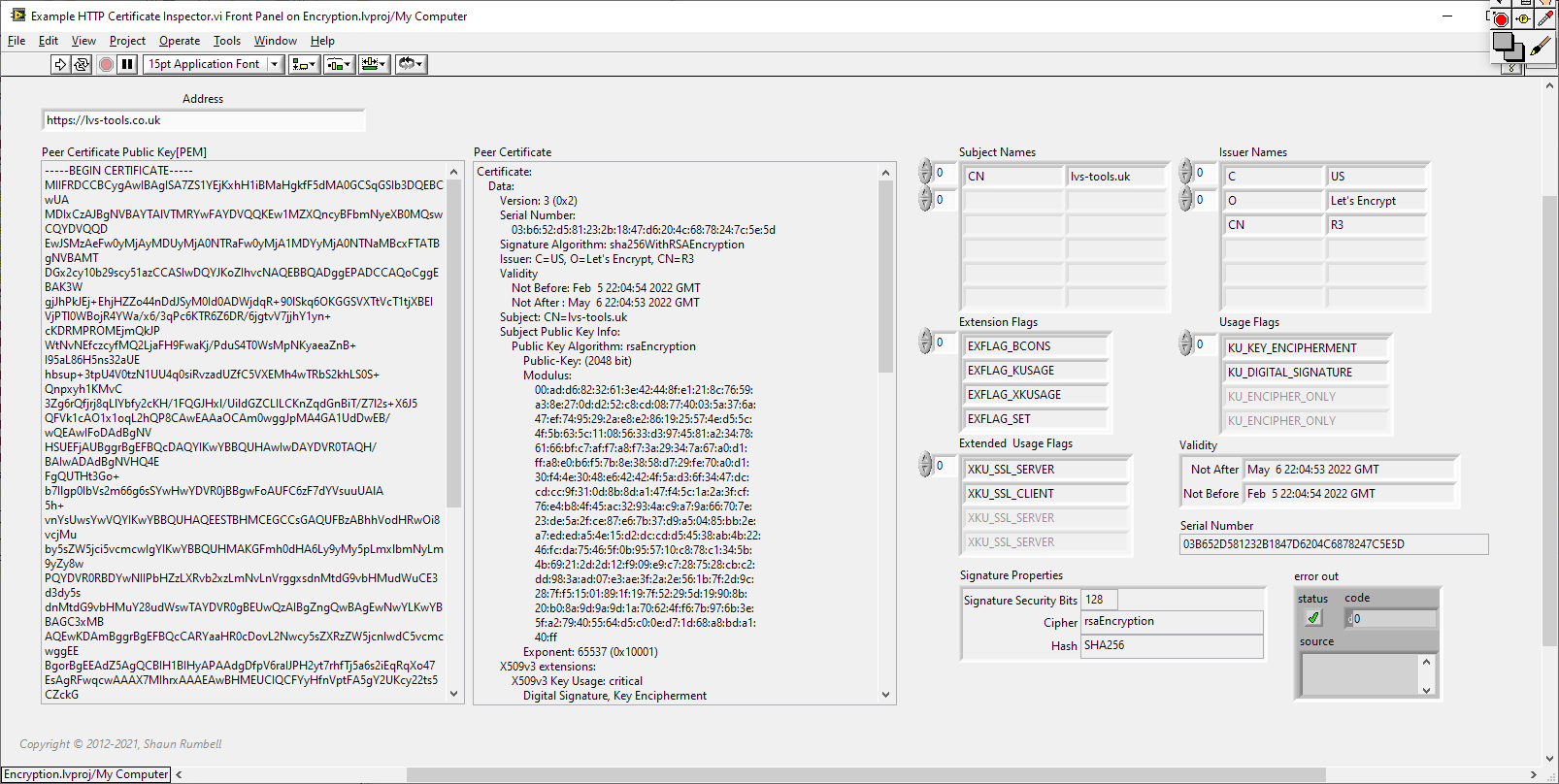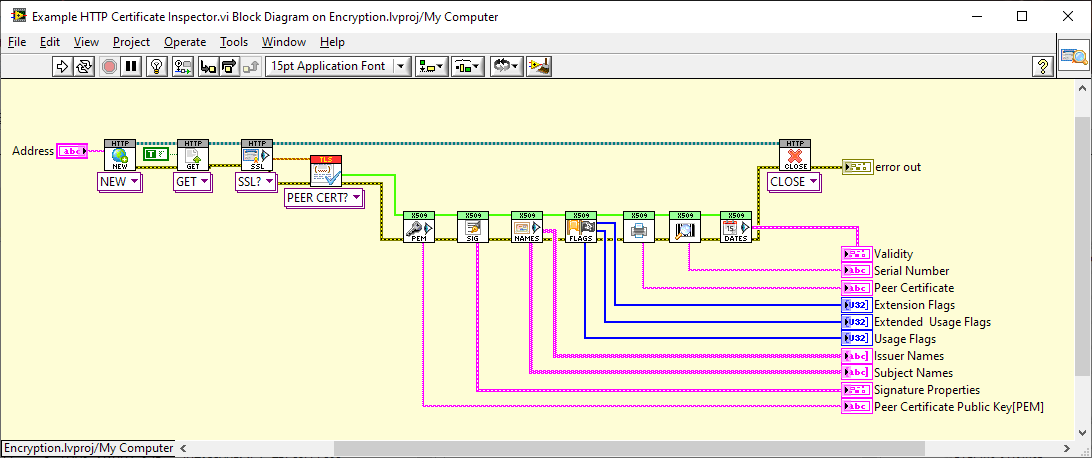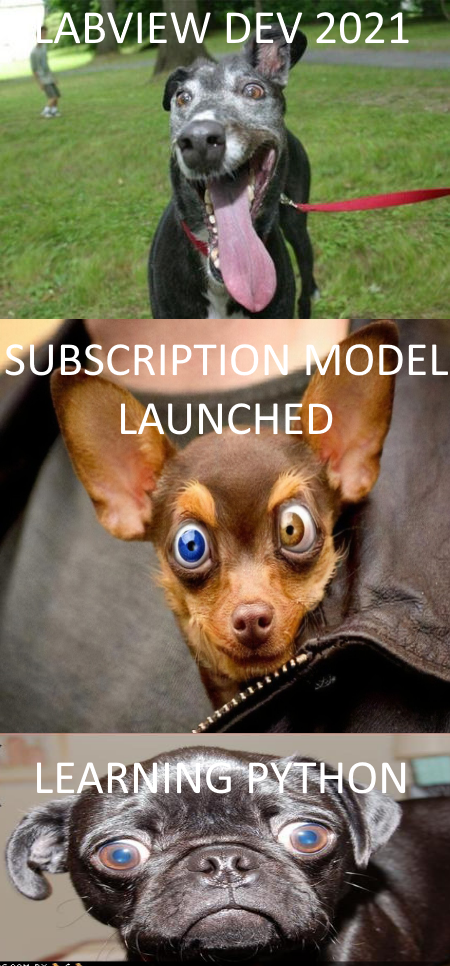-
Posts
4,999 -
Joined
-
Days Won
311
Content Type
Profiles
Forums
Downloads
Gallery
Everything posted by ShaunR
-
Send an email to support@lvs-tools.co.uk with this info and we can start to look more closely at it. The next release has a lot more functions to deal with x.509 attributes so we can probably resolve this if we know what the NI OPC toolkit is expecting and make sure the attribute function is available to set them. With regards to the signature, those functions simply convert the byte array using the following code. So it seems strange that there is a disparity between the byte array and the hex string representation.
-
Just a heads-up. NI are offering Tools Network products the opportunity to move from the classic LVTN licence to a subscription licence. There aren't many details as yet and it's not clear whether you will lose access to the [separate] LVTN products if you don't keep up your subscription to LabVIEW itself, but it looks like everything will eventually be behind their subscription model.
-
I actually get this.
-
BBC Pidgin.
-
Except for all the in-place structures and array manipulation That won't save it in the i+j notation, hence my question. It also looks like the OP wants to interleave the data from the two graphs to get to his table when he could just have built the array the "old way" and sliced out the data for display.
- 4 replies
-
- save
- measurement
-
(and 1 more)
Tagged with:
-
The reason this doesn't work is because you are building a plot array of complex numbers and the Save To Spreadsheet accepts doubles. I expect what you were seeing was just the real part as the complex numbers were converted to doubles. Why are you building the array as complex numbers? Do you wish to save the data in complex notation?
- 4 replies
-
- save
- measurement
-
(and 1 more)
Tagged with:
-

I am taking a sabbatical from LabVIEW and NI R&D
ShaunR replied to Aristos Queue's topic in LAVA Lounge
I have to agree. The proxy indicator of Job positions also shows a rapid decline in Europe. Not sure if that is replicated in the US but I suspect it is. -

Interactive Webpage VI Options
ShaunR replied to hooovahh's topic in Remote Control, Monitoring and the Internet
No longer a stand-alone product. The Websocket API was rolled into ECL sans the FP and HTML library portion. -
It's 8 months apart. I don't think it's a concerted effort to spam. It is useful to highlight products from time to time. Maybe we should have a commercial product sub forum for these types of products.
-
Yes. It's not a new idea, BTW. This is the route ladder logic went for state machines in PLC's. Ignoring the boiler plate scripting for a moment. What is really missing is an intuitive way to view a program's structure. I said a long time ago that we need something similar to (the now defunct) Firefox 3D View. This could be a mode of the VI Hierarchy diagram allowing us to inspect the way subVI's are interconnected and allow us to zoom in and isolate areas of interest. Event and queue [message] tunnels or the "Channels" could easily be shown which are invisible with the tools we use today.
-
I don't know why they continue to push these "place a VI that transforms into a mess of code". It always seems to me they are solving the symptom, not the cause, by automating the replication of boiler-plate code we have to do when the real goal is not to have to replicate at all. A long time ago I posted a VIM that, awkwardly, implemented "named events" and the "framework" was to use that and a queue with a bit of string manipulation to send messages back again. It was basically the the same as MessengerM, shown here. It would have been much better if the event structure could use named events (wire a string to the terminal?) and have an [optional] output on the right hand side for a message out/back. That would implement the MessengerM without all this malarky. Certainly in a lot of the event driven API's I now produce, there is a "Source" on the left side of an event structure. That could just be wired across to a "target" on the opposite side to send a message back to an individual stack (aka a queue output). Bonus points if the "target" can be marked as "broadcast" to behave as "Generate user Event". I dare say that it could be refined further with a bit more thought too, since what we have to do is figure out who sent the message and act accordingly-the event structure already knows who sent the event.
-
And when you do, there are still options
-
I'm a collaborator and I'm not sure I like that. I'd prefer to be in the resistance.
-

I am taking a sabbatical from LabVIEW and NI R&D
ShaunR replied to Aristos Queue's topic in LAVA Lounge
I think this is a very positive thing that more should be encouraged to take part in. For Application engineers and R&D Devs to do sabbaticals, on loan, to companies would build good relationships in the industry and ensure tight cohesion and understanding between the developers of LabVIEW and the customers' that use LabVIEW. There is nothing like a dose of ones own medicine to encourage improving the taste. -
A quart of oil? Robot confirmed.
-
Tin foil hat time We know there were discussions about SaaS that the LabVIEW dev team were resisting. I think this is the real reason why AQ left.
-
Storing hidden programs is not unusual for you? It's highly suspicious to me. As separate operations, Run When Opened isn't common and storing hidden programs even less so. Both together start alarms bells ringing for me.
-

LabVIEW portable pointer sized element
ShaunR replied to Taylorh140's topic in Calling External Code
At the risk of derailing the thread; that's not really what I was talking about. It's that I *have* to use the localheap for the function to fill with data. I then used moveblock to copy the data from the localheap to a U8 Array and it's this copy which is when I was casting to a cluster. My surprise was that a function that populated the memory *required* the memory created with localheap, not the pointer, per se. Now I should be able to moveblock it directly to a cluster, now I know what's happening, and avoid the cast completely. -

LabVIEW portable pointer sized element
ShaunR replied to Taylorh140's topic in Calling External Code
Insightful and amazing you identified that from my terse comment. Yes indeed. It seems that the source was indeed a type-cast and I was unaware of this "feature". I retract my previous comment but won't delete it for historical reference. Indeed. However the function that returns it required a call to create localheap memory (in the Win32 API) which I then needed to get back into a cluster. Otherwise I would have used this method. This, in itself, was unusual so maybe I'm missing something else too in this particular example. -
In this context it just means challenging existing monopolies, orthodoxies or methods. Text-book examples would be things like streaming to terrestrial TV, block-chain to banking etc.
-

LabVIEW portable pointer sized element
ShaunR replied to Taylorh140's topic in Calling External Code
Most recently I had to do this with QUERY_SERVICE_CONFIGA -
I rest my case.







